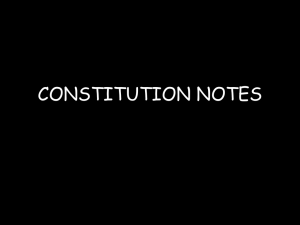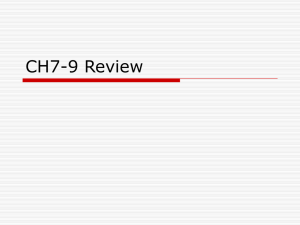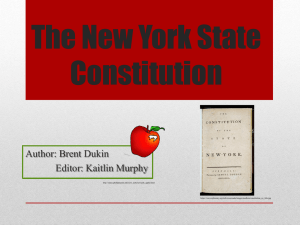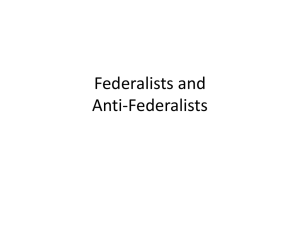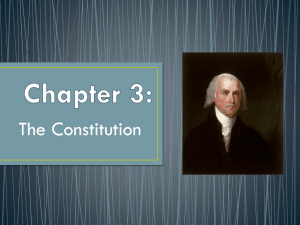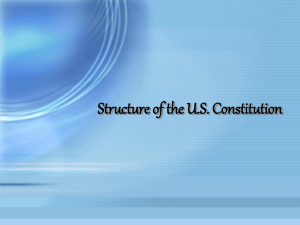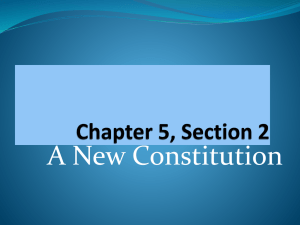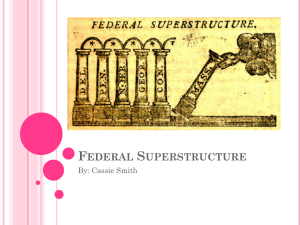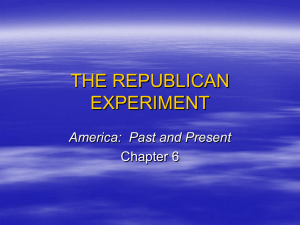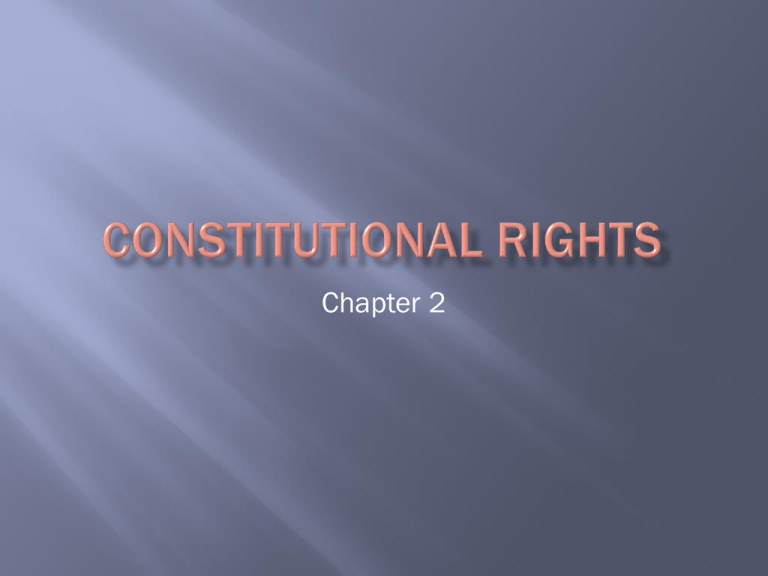
Chapter 2
Section 2-1
1.
Declaration of Independence
2.
Articles of Confederation
3.
July 4, 1776
Declared that we wanted to be free of British rule and
listed why
1st attempt of a constitution for the U.S.
1781-1787
Replaced by our current Constitution
U.S. Constitution
The Bill of Rights
Amendments
Drafted in 1787, declared effective for all colonies on March
4, 1789
Outlines:
1. the reason for we were
declaring to be free
from England
2. rights every person
should have
3. the purpose of a
government
4. the reasons for
abolishing the current
government we were
under
5. a list of complaints
with being under
English rule
6. rights that we would
have as free states
1.
2.
3.
4.
5.
6.
7.
8.
Unfair taxes
Cutting off trade for the
colonists
Abolishing good laws
Creating new government
departments with officials
that harass people
Depriving colonists of trial by
jury
Protecting British officials
that were murderers
Hiring mercenaries to harass
and kill people
Capturing and forcing
colonists to fight against
other colonists or be killed
IN 1781 the 13
original colonies
united under the
Articles of
Confederation
The Articles were the
1st attempt to
establish a
government for the
newly formed United
States
Some things the Articles of Confederation did :
1. Created a one house law making body (the
Continental Congress)
1. 2 to 7 representatives from each state but each state
got only one vote
2.
3.
4.
5.
6.
7.
Put term limits on members of Congress
Gave the U.S. power to declare war or make
peace
Created a postal system
Gave the U.S. power to “coin” (make) money
Appoint a Commander in Chief (president)
Create a national defense (the military)
Many people felt the need for a stronger central
government than what the articles provided.
Fixing the articles called for a special convention
of representatives from each of the states. This
special convention was held in Philadelphia, PA
where they worked in a new document called the
U.S. Constitution.
The Articles of
Confederation
needed to be fixed!
The U.S. Constitution was drafted with 7 articles
to create a strong government for the U.S.
It is the basic law of the land that sets up the
offices of government and how they work, and
lists the powers of each of the branches.
It was drafted in the summer of 1787.
Our existence as a truly united country began on
March 4, 1789 when Congress declared the
Constitution effective and binding. At this point
there were only 4 of the 13 original states that
thought the Constitution still needed work
because it failed to list rights we should have as
U.S. citizens. This led to the addition of some
amendments called “the Bill of Rights”.
The first 10 amendments to the Constitution are
called the Bill of Rights
The Bill of Rights were created to make sure that
U.S. citizens would enjoy the basic rights that
were listed in the Declaration of Independence.
The Bill of Rights lists all the rights that U.S.
citizens are guaranteed by law.
Congress shall make no law respecting an establishment of
religion, or prohibiting the free exercise thereof; or abridging
the freedom of speech, or of the press; or the right of the
people peaceably to assemble, and to petition the
Government for a redress of grievances.
A well regulated Militia, being necessary to the security of
a free State, the right of the people to keep and bear
Arms, shall not be infringed.
No Soldier shall, in time of peace be quartered in any
house, without the consent of the Owner, nor in time of
war, but in a manner to be prescribed by law.
The right of the people to be secure in their persons,
houses, papers, and effects, against unreasonable
searches and seizures, shall not be violated, and no
Warrants shall issue, but upon probable cause, supported
by Oath or affirmation, and particularly describing the
place to be searched, and the persons or things to be
seized.
No person shall be held to answer for a capital, or otherwise infamous crime,
unless on a presentment or indictment of a Grand Jury, except in cases
arising in the land or naval forces, or in the Militia, when in actual service in
time of War or public danger; nor shall any person be subject for the same
offence to be twice put in jeopardy of life or limb; nor shall be compelled in
any criminal case to be a witness against himself, nor be deprived of life,
liberty, or property, without due process of law; nor shall private property be
taken for public use, without just compensation.
In all criminal prosecutions, the accused shall enjoy the right to a speedy and
public trial, by an impartial jury of the State and district wherein the crime
shall have been committed, which district shall have been previously
ascertained by law, and to be informed of the nature and cause of the
accusation; to be confronted with the witnesses against him; to have
compulsory process for obtaining witnesses in his favor, and to have the
Assistance of Counsel for his defense.
In Suits at common law, where the value in controversy
shall exceed twenty dollars, the right of trial by jury shall
be preserved, and no fact tried by a jury, shall be
otherwise re-examined in any Court of the United States,
than according to the rules of the common law.
Excessive bail shall not be required, nor excessive fines
imposed, nor cruel and unusual punishments inflicted.
The enumeration in the Constitution, of certain rights,
shall not be construed to deny or disparage others
retained by the people.
The powers not delegated to the United States by the
Constitution, nor prohibited by it to the States, are
reserved to the States respectively, or to the people.
Through the Bill of Rights and other amendments
that were to follow (there are 27) the Constitution
became a shield for the personal, natural rights of
the individual. These rights are referred to as civil
rights.
13th Amendment
1865
15th Amendment
1870
19th Amendment
1920
26th Amendment
1971
Neither slavery nor involuntary
servitude, except as a
punishment for crime whereof the
party shall have been duly
convicted, shall exist within the
United States, or any place
subject to their jurisdiction.
End of slavery
The right of citizens of the United
States to vote shall not be denied
or abridged by the United States
or by any State on account of
race, color, or previous condition
of servitude--
The right to vote cannot
be denied due to race,
color, or if you were
previously a slave
The right of citizens of the United
States to vote shall not be denied
or abridged by the United States
or by any State on account of sex.
The right of citizens of the United
States, who are eighteen years of
age or older, to vote shall not be
denied or abridged by the United
States or by any State on account
of age.
The right to vote can no
longer be denied to
women
The right to vote was
changed from age 21 to
18.
1.
2.
3.
4.
When was the Declaration of Independence
adopted?
The inalienable rights mentioned in the
Declaration of Independence are “life, liberty,
and the pursuit of _________.”
The 13 colonies originally created a common
government under the Articles of __________.
Critics of the original Constitution claimed the
wording failed to protect human _______.
Section 2-2
The writers of the Constitution devised a
unique system to govern our newly free
country.
This system was called the system of
checks and balances.
a system which gives specific authority to each
of the three basic branches of government
Legislative Branch
•Congress
Executive Branch
•President and Vice President
Judicial Branch
•Supreme Court
Legislative means “having the function of creating laws”
The legislative branch at the federal government is Congress
Congress consists of
a Senate—2 members from each state (elected for a 6 year term)
a House of Representatives—seats are in proportion to state size (elected for a
2 year term)
Senate can block any action of the House, House can block
any action of the Senate
The House has the power to impeach any civil officer for
treason, bribery, or other crimes
Impeachment cases involve trying a government official for
misconduct in office—conviction requires a 2/3 vote
Who are the only two Presidents of the U.S. to be impeached?
The executive branch is headed by the President
and Vice President.
People vote for electors who will give electoral
votes to a candidate
The person who wins the popular vote may not
win the election (1824, 1876,1888, 2000)
A political party is a private organization of
citizens who select and promote candidates for
election to public office
The judicial branch is headed by the Supreme
Court
The Supreme Court:
decides if laws passed by the legislative branch and
signed by the President violate the U.S. Constitution in
any way
Hears cases that were brought to court and appealed to
them. The Supreme Court uses the U.S. Constitution to
make a decision on the case. They only hear certain
cases where a Constitutional issue is involved.
Interprets the Constitution. If they think the Constitution
needs to be changed they will add an amendment to
the Constitution.
The Constitution may be amended in two ways.
1. The amendment is proposed by a 2/3 majority vote in
both the House and the Senate.
2. The legislatures of 2/3 of all of the states call a
convention of all of the states.
Under either method of proposal, the amendment
becomes a valid part of the U.S.Constitution only if it is
ratified by the legislatures of ¾ of the states, or if it is
ratified by conventions in ¾ of the states.
(The first way has been the way all the amendments
have been adopted to date.)
In a pure democracy, every adult citizen may vote
on all issues. (we do not have this)
In a representative democracy, or republic, voters
select representatives that will vote on issues.
Sovereignty means freedom from external control.
The 10th amendment acknowledges the
continued sovereignty of all the states to govern
their own people within their own borders. It is a
shield against unlimited power by the federal
government.
The 14th Amendment says, “All persons born or
naturalized in the United States and subject to
the jurisdiction thereof, are citizens of the United
States and of the state wherein they reside. No
state shall make or enforce any law which abridge
the privileges or immunities of citizens of the
United States; nor shall any State deprive any
person of life, liberty, or property without due
process or law………”
This Amendment limits the power and protects
against an abuse of power by state governments.
The federal government has the right to:
protect every state against invasion
establish post offices
coin money
tax imports and exports
The federal government has the power to regulate
interstate commerce (trade that affects trade
between states)
States retain the authority to regulate intrastate
commerce, or trade within its own borders.
I pledge allegiance to
the flag of the United
States of America, and
to the republic, for
which it stands, one
nation, under God,
indivisible, with liberty
and justice for all.
1.
2.
3.
4.
5.
6.
7.
8.
What does separation of powers mean?
What is a system of checks and balances?
What are the three branches of government and
who is in each branch?
What does the legislative branch do?
What does the Supreme Court do?
Can the Constitution be changed?
What type of democracy does the U.S. have?
What are some powers of the federal
government?


